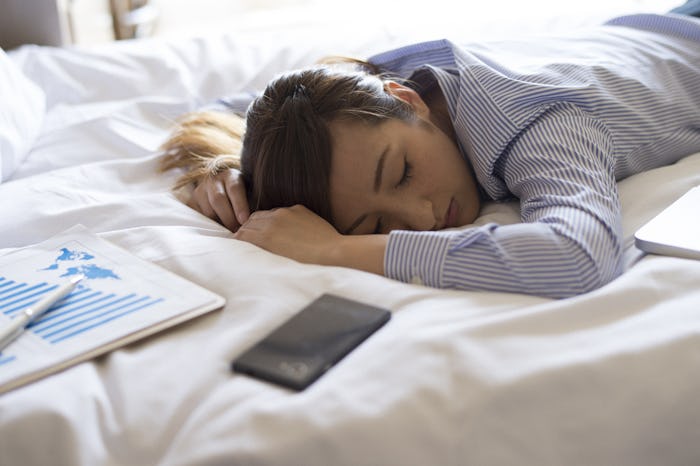Life

9 Bedtime Routines For Working Moms That Ensure A Good Night's Sleep
Once you get the kids to sleep, it's easy to delve into the to-do list that's been begging for your attention. With e-mails to answer, shows to catch up on, and laundry to be put away, you could easily stay up until the wee hours checking every item off. But if you're a mom who feels overworked and under-rested, it's time to put some effort into your nighttime rituals. You need some bedtime routines for working moms that ensure a good night's rest. Because a solid night of slumber will have you feeling like a new woman by morning.
According to Very Well's website, "adults need daily sleep rituals prior to going to bed to allow us to unwind and mentally prepare for going to sleep." Giving in to more sleep may seem counterproductive when you have so many responsibilities to take care of, but investing in your rest will ultimately make you healthier and happier over time. Incorporating a few relaxing rituals to your pre-sleep routine will set you up for a solid night of rest, so you'll wake up feeling more energized and ready for your day.
Don't let another night of dreamy s pass you by. Get on board with these nine bedtime routines for working moms and change the way you sleep for good.
1Power Down
With smartphones, tablets, and laptops looming by our bedside, it's easy to be tempted to do just one more scroll through Instagram, or send another email. But staring at those screens can cause you to stay up past your bedtime. As Working Mother magazine reported, you should keep all electronics out of your bedroom (and this includes TV) to promote a good night of sleep. If you need something to help you wind down, thumb through a magazine or read a paper book.
2Stretch
Whether you sit at a desk all day or spend much of your time on the go, your body can start to unwind with some gentle movement. Use some of these simple stretches to help you sleep better, suggested by Fitness magazine. Add more zen to your stretching routine by taking deep and steady breaths.
3Warm Up
Since your body temperature fluctuates throughout the night, timing a warm bath right can prepare your body to fall asleep. As Joyce Walsleben, associate professor at New York University School of Medicine told Health magazine, "if you raise your temperature a degree or two with a bath, the steeper drop at bedtime is more likely to put you in a deep sleep."
4Drop (The Temperature) Low
Creating a good sleep environment should be part of your nightly routine. To get your room ready, you'll want to click the thermostat down a few degrees. According to the website for The National Sleep Foundation, the best temperature for sleep is between 60 and 67 degrees.
5Dry Up
Drinking too much close before bed may lead to a restless night of sleep. Consuming liquids too late can interrupt sleep, according to Mayo Clinic, no matter what you're drinking. Caffeine and alcohol can make you toss and turn, and too much fluid could wake you up for bathroom breaks. Cut yourself off a few hours before you plan to hit the sack.
6Listen To Chillout Tunes
It's easy to get sucked into binge watching your shows, but too much TV could keep you awake later than you like. Instead, try putting on some relaxing music to wind down your day, as Very Well's website suggested.
7Meditate
Quiet your mind for a peaceful sleep with meditation. You don't have to be an expert to meditate — try some meditations specific to sleep recommended by Mind Body Green. Let these routines guide you to your happy place where sleep is easy and plentiful.
8Set Your Rhythm
Sleep is a natural function of the body, much like blinking or breathing. But with sleep, you have the power to train your body for rest. As the National Sleep Foundation recommended, go to bed around the same time every night to help your body get the best sleep possible.
9Darken The Room
Maybe it goes back to Caveman roots, but the darker the room, the better the sleep. As Everyday Health pointed out, too much light interferes with sleep and can lead to bigger problems when prolonged. Creating a dark environment could help you conquer insomnia as well as boost your health.